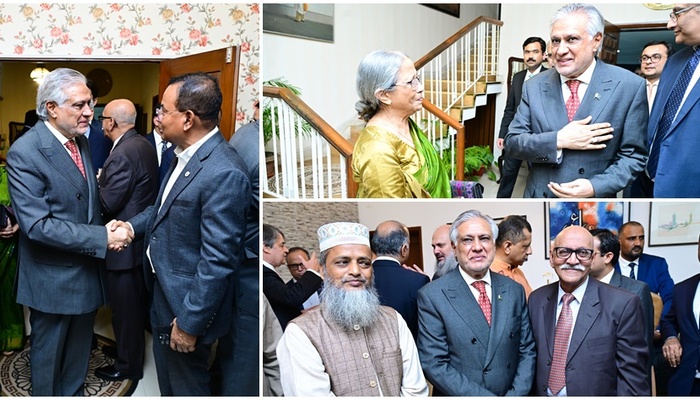Ishaq Dar’s Dhaka visit has been hailed as a symbolic family reunion, highlighting the deep historical ties between Pakistan and Bangladesh. Defence analyst Dr. Abdullah Hameed Gul described the trip as a turning point, noting that Bangladesh was once part of Pakistan, and the bond between the two nations continues to endure despite decades of separation. His remarks placed the visit within a broader narrative of reconciliation, regional shifts, and the rejection of Indian influence in Bangladesh.
A Symbol of Shared History
Dr. Gul emphasized that Pakistan and Bangladesh remain linked like members of a family separated by circumstance. He recalled how Bangladesh’s independence in 1971 marked a painful chapter in South Asian history. At that time, Indian leaders, especially Prime Minister Indira Gandhi, sought to showcase the event as the end of the two-nation theory.
According to him, Gandhi’s declaration that the two-nation theory had been “drowned in the Bay of Bengal” reflected India’s ambitions. Yet, more than five decades later, Dr. Gul argued, the ideology has not only survived but has proven resilient. Today, he claimed, the two-nation theory continues to define political realities in the region, pushing India out of Bangladesh’s domestic narrative.
Shifts in Bangladeshi Sentiment
Dr. Gul pointed out signs of growing goodwill toward Pakistan among ordinary Bangladeshis. He noted that on Pakistan’s Independence Day this August, sales of Pakistani flags surged in Bangladesh, second only to Pakistan itself. For him, this trend demonstrates that the people of Bangladesh still harbor affection for Pakistan despite years of strained ties.
He also highlighted recent public expressions of solidarity. According to him, Bangladeshi crowds have even raised slogans of “Pakistan Zindabad” following the rejection of Indian ideology on their soil. In his view, these actions mark a shift away from India’s decades-long propaganda and influence.
Read: NBP Launches First PayPak Pink Debit Card for Women
The Decline of Indian Influence
India’s role in shaping Bangladesh’s early years has been significant, but Dr. Gul argued that the tide is turning. He claimed that the legacies of former Prime Minister Sheikh Hasina Wajid and her father, Sheikh Mujibur Rahman, no longer command respect among younger generations in Bangladesh. Their names, he said, are gradually fading from public discourse, with people no longer wishing to recall their role in history.
Dr. Gul described this as a rejection of India’s narrative. He stated that Indian propaganda once manipulated the trust of Bengali people, painting Pakistan in a negative light. However, with the rise of new generations, he believes that narrative has collapsed. Indian diplomatic, economic, and cultural efforts to strengthen ties with Bangladesh, he added, have weakened.
Pakistan’s Strategic Message
Ishaq Dar’s Dhaka visit, according to Dr. Gul, carries strategic weight. By traveling to Bangladesh, the Deputy Prime Minister not only reinforced Pakistan’s readiness to rebuild bilateral ties but also sent a direct message to India. For him, the visit demonstrates Pakistan’s confidence and signals that India’s regional influence is waning.
The timing of the visit is also significant. As regional alignments shift and South Asian nations seek stronger economic and security partnerships, Pakistan is seizing the opportunity to reconnect with Bangladesh. Dr. Gul framed the visit as both a diplomatic and symbolic move, reflecting Pakistan’s vision of uniting communities divided by history.
Strengthening Bilateral Relations
Beyond symbolism, the visit carries the promise of practical cooperation. Dr. Gul noted that closer collaboration between Pakistan and Bangladesh could cover areas such as defense, trade, strategic planning, and cultural exchange. By fostering mutual understanding, both nations could benefit from shared opportunities while also countering external pressures.
He further suggested that Ishaq Dar’s presence in Dhaka may pave the way for high-level bilateral exchanges in the near future. This, he argued, would mark the beginning of a new era in which Pakistan and Bangladesh could rise together as partners.
India’s Regional Setback
Dr. Gul placed the visit within a broader geopolitical context. He argued that India, once confident of its influence in Bangladesh, now finds itself sidelined. With its economic and diplomatic outreach faltering, India is seen by him as a loser in the contest for regional goodwill.
According to Dr. Gul, the erosion of Indian narratives in Bangladesh and the growing warmth toward Pakistan reflect a larger trend of New Delhi’s decline in South Asia. He asserted that global opinion is increasingly critical of India, further weakening its position.
A Beacon for the Future
Dr. Gul concluded that Ishaq Dar’s Dhaka visit represents more than a diplomatic stop. For him, it is a beacon of light for the future of Pakistan-Bangladesh relations. He believes the trip has rekindled a sense of unity between two nations that once shared the same homeland.
By framing the visit as a reunion, Dr. Gul underscored the idea that history cannot erase the cultural and emotional bonds between Pakistanis and Bangladeshis. He suggested that by building on this renewed goodwill, both countries could rise together in a new era of cooperation.
Follow us on Instagram, YouTube, Facebook,, X and TikTok for latest updates
